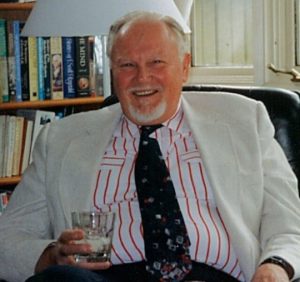Each Fall ConnectiCOSH holds its annual health and safety convention that is attended by numerous workplace health and safety professionals and advocates. The convention includes a swap meet that allows the attendees to share various details of their workplace health and safety environment with others, numerous workshops on various pertinent topics and a keynote speech from well-known safety professionals or activists such as Fed OSHA’s David Michaels and Jordan Barab, Labor Institute Founder Les Leopold, or Environmental Activist Lois Gibbs.
In 2019, the convention was renamed the Ray Elling Health and Safety Convention in honor of Ray Ellling, one of ConnectiCOSH’s founders who had passed away earlier that year. A tribute to him is below:

Ray H. Elling, PhD., age 89, died peacefully on Friday, November 23rd, 2018 in the University of Connecticut’s John Dempsey Hospital after a very brief stay. Born July 23rd, 1929 to immigrant Swedish parents, Ray grew up the youngest of three sons in Minnesota. In early adulthood, Ray joined the U.S. Army and served in the reconstruction effort in Japan and then in Austria where he met and married Margit Schreiber in 1952. He returned to the U.S. with Margit, began a family and pursued graduate studies in the nascent field of medical sociology. He received his Master’s Degree from the University of Chicago and his Ph.D. from Yale University. From his earliest years Ray was an ardent peace activist, supporter of women’s rights, champion of ethnic and race relations, and, eventually, advocate for disability rights. His studies of health care systems and outcomes in a variety of cultures resulted in a two-year appointment as a consultant to the World Health Organization in the early 1970’s. He was also instrumental in founding the Connecticut Council on Occupational Safety and Health, Inc. in 1981.
While a prolific researcher and an accomplished writer/editor of scholarly works such as Traditional & Modern Medical Systems (June 1981), Struggle for Workers’ Health: A Study of Six Industrialized Countries (February 1986) and Health and health care for the urban poor: A study of Hartford’s North End (Connecticut health services research series) 1974, his real passion was teaching and he leaves behind a generation, if not two, of researchers, academicians and practitioners. As a founding faculty member of the University of Connecticut Medical School, Ray worked to make sure that UConn medical students were well instructed in the needs of the underserved and overlooked. His last role was as an officer in the Citizens Coalition for Equal Access (CC=A) who successfully pushed the Unionville, Farmington and West Hartford branches of the U.S. Postal Service to make their services properly accessible to people with disabilities. These successes led to Concurrent Resolutions calling for automatic doors in all federally funded buildings which the U.S. Senate unanimously approved. Not content with federal buildings, Ray moved on to push for mandating the use of “universal design” in all federally funded projects.
He is survived by his wife of 27 years, Marilyn, his eldest son, Ron, his youngest son, Martin, his daughter-in-law, Xenia, his grandchildren, Tyson, Jessica, Jason and Kristofer and many great grandchildren. He was preceded in death by his wife of 38 years, Margit, and his second son, Gerard.
Ray’s work and his life touched and benefited so many, most of whom he did not know, and so we can say of him, as he oft said to others, “Good on ya, mate!”
